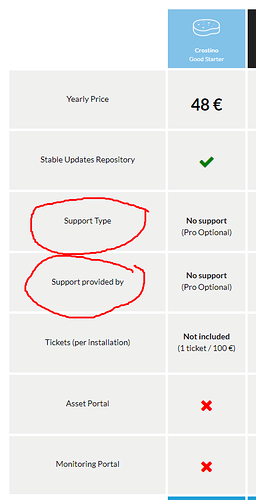Hi Ralph, thank you for your answer. Thats right and typical for such projects, not new for me.
But for me, the context of the discussion shifted at the moment when it was about how to broaden the installation base - at least that’s how I understood the question of which subscriptions would make sense in the future.
And I completely agree, SLA-based support must of course be linked to a higher quality subscrition. To suggest that I have expectations that I want the all-inclusive package with Crestino is ridiculous.
But what I also mean is, if you want to have more professional users, then the response of community or Crestino users should not be left to the day-to-day form of individual dedicated members. Nor should users have to feel second-rate just because they are not Linux admins, but just ambitious users. The community users of today are perhaps the professional and paying users of tomorrow and insofar important multipliers.
And that I am not completely unworldly, I experience in the likewise non-commercial Pihole project. Sorry if I’m bothering someone with my pushiness. I just think that there is an uncanny amount of potential being wasted.
I find the view of @pike very applicable:
“Community is a place for talk, understand, learn, find something new. It’s used for discussing howto, development goals, new interesting software.”
I’m very motivated to learn, to discuss. And newbies have a lot learn with Nethserver.
I myself have been using Linux since the 90’s. Unfortunately not continuously and therefore I keep forgetting a lot.
But if you come from Debian, even Centos is quite a change, especially since you only casually notice that manual intervention in the configuration leads to chaos, that Nethserver regulates its administration via E-Smith templates.
No apology is necessary, everybody knows that. But as the installed base grows, the community grows and more load can be distributed.
Having a blue print that you can then adapt to your individual needs is a great advantage for me, because it makes the transfer of know-how easier. The wiki and the documentary are too abstract for me. How-tos or use cases can build a bridge between technical documentation and individual problem cases.
It is particularly difficult to find out if I cannot implement my requirements because I have a faulty configuration, the system (e.g. Cockpit) still has quirks or other basic conditions are not right. Let us stay in your example:
I tried Ndpi-blocking (YouTube and QUIC), I have no chance to find out why it does not work. Now I have probably managed it via web filter. A manual would have helped me a lot.
Thanks for the encouragement! I don’t give up that easily. It would only be easier if you did not have to have a guilty conscience, just because the question might not be asked properly and you have to worry about upsetting the experts.
Added to this is the language barrier, which makes it easy to express oneself misunderstandably.
All right, that’s enough of this. I really hope that Nethserver will be successful and everybody will be happy 
![]()
![]()
![]()


